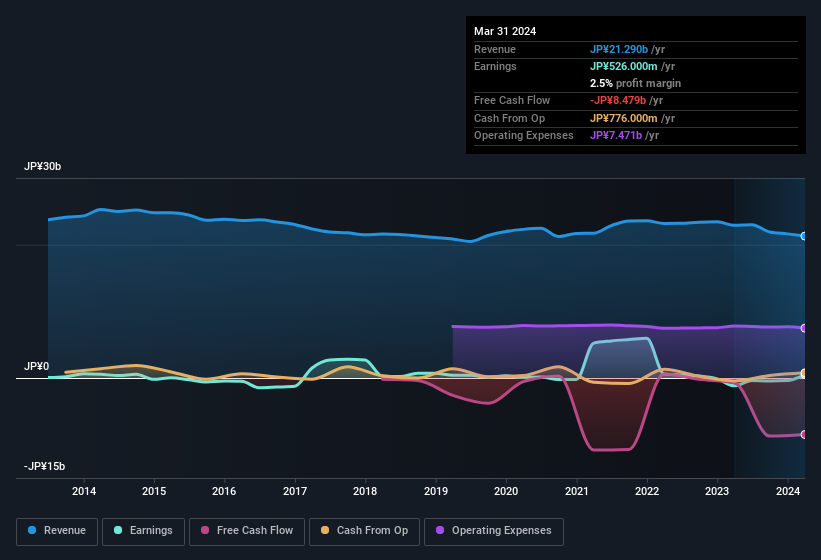- Japan
- /
- Communications
- /
- TSE:6704
Why Iwatsu Electric's (TSE:6704) Healthy Earnings Aren’t As Good As They Seem

Iwatsu Electric Co., Ltd. (TSE:6704) posted some decent earnings, but shareholders didn't react strongly. Our analysis suggests they may be concerned about some underlying details.
View our latest analysis for Iwatsu Electric

A Closer Look At Iwatsu Electric's Earnings
As finance nerds would already know, the accrual ratio from cashflow is a key measure for assessing how well a company's free cash flow (FCF) matches its profit. In plain english, this ratio subtracts FCF from net profit, and divides that number by the company's average operating assets over that period. The ratio shows us how much a company's profit exceeds its FCF.
That means a negative accrual ratio is a good thing, because it shows that the company is bringing in more free cash flow than its profit would suggest. While having an accrual ratio above zero is of little concern, we do think it's worth noting when a company has a relatively high accrual ratio. That's because some academic studies have suggested that high accruals ratios tend to lead to lower profit or less profit growth.
Over the twelve months to March 2024, Iwatsu Electric recorded an accrual ratio of 0.37. Statistically speaking, that's a real negative for future earnings. To wit, the company did not generate one whit of free cashflow in that time. In the last twelve months it actually had negative free cash flow, with an outflow of JP¥8.5b despite its profit of JP¥526.0m, mentioned above. We also note that Iwatsu Electric's free cash flow was actually negative last year as well, so we could understand if shareholders were bothered by its outflow of JP¥8.5b. However, that's not the end of the story. We can look at how unusual items in the profit and loss statement impacted its accrual ratio, as well as explore how dilution is impacting shareholders negatively. One positive for Iwatsu Electric shareholders is that it's accrual ratio was significantly better last year, providing reason to believe that it may return to stronger cash conversion in the future. As a result, some shareholders may be looking for stronger cash conversion in the current year.
Note: we always recommend investors check balance sheet strength. Click here to be taken to our balance sheet analysis of Iwatsu Electric.
One essential aspect of assessing earnings quality is to look at how much a company is diluting shareholders. As it happens, Iwatsu Electric issued 49% more new shares over the last year. As a result, its net income is now split between a greater number of shares. Per share metrics like EPS help us understand how much actual shareholders are benefitting from the company's profits, while the net income level gives us a better view of the company's absolute size. You can see a chart of Iwatsu Electric's EPS by clicking here.
A Look At The Impact Of Iwatsu Electric's Dilution On Its Earnings Per Share (EPS)
As it happens, we don't know how much the company made or lost three years ago, because we don't have the data. And even focusing only on the last twelve months, we don't have a meaningful growth rate because it made a loss a year ago, too. What we do know is that while it's great to see a profit over the last twelve months, that profit would have been better, on a per share basis, if the company hadn't needed to issue shares. And so, you can see quite clearly that dilution is having a rather significant impact on shareholders.
If Iwatsu Electric's EPS can grow over time then that drastically improves the chances of the share price moving in the same direction. However, if its profit increases while its earnings per share stay flat (or even fall) then shareholders might not see much benefit. For the ordinary retail shareholder, EPS is a great measure to check your hypothetical "share" of the company's profit.
How Do Unusual Items Influence Profit?
Given the accrual ratio, it's not overly surprising that Iwatsu Electric's profit was boosted by unusual items worth JP¥1.1b in the last twelve months. While it's always nice to have higher profit, a large contribution from unusual items sometimes dampens our enthusiasm. We ran the numbers on most publicly listed companies worldwide, and it's very common for unusual items to be once-off in nature. And, after all, that's exactly what the accounting terminology implies. Iwatsu Electric had a rather significant contribution from unusual items relative to its profit to March 2024. All else being equal, this would likely have the effect of making the statutory profit a poor guide to underlying earnings power.
Our Take On Iwatsu Electric's Profit Performance
Iwatsu Electric didn't back up its earnings with free cashflow, but this isn't too surprising given profits were inflated by unusual items. The dilution means the results are weaker when viewed from a per-share perspective. On reflection, the above-mentioned factors give us the strong impression that Iwatsu Electric'sunderlying earnings power is not as good as it might seem, based on the statutory profit numbers. If you want to do dive deeper into Iwatsu Electric, you'd also look into what risks it is currently facing. To that end, you should learn about the 5 warning signs we've spotted with Iwatsu Electric (including 3 which are potentially serious).
In this article we've looked at a number of factors that can impair the utility of profit numbers, and we've come away cautious. But there are plenty of other ways to inform your opinion of a company. Some people consider a high return on equity to be a good sign of a quality business. So you may wish to see this free collection of companies boasting high return on equity, or this list of stocks with high insider ownership.
If you're looking to trade Iwatsu Electric, open an account with the lowest-cost platform trusted by professionals, Interactive Brokers.
With clients in over 200 countries and territories, and access to 160 markets, IBKR lets you trade stocks, options, futures, forex, bonds and funds from a single integrated account.
Enjoy no hidden fees, no account minimums, and FX conversion rates as low as 0.03%, far better than what most brokers offer.
Sponsored ContentNew: AI Stock Screener & Alerts
Our new AI Stock Screener scans the market every day to uncover opportunities.
• Dividend Powerhouses (3%+ Yield)
• Undervalued Small Caps with Insider Buying
• High growth Tech and AI Companies
Or build your own from over 50 metrics.
Have feedback on this article? Concerned about the content? Get in touch with us directly. Alternatively, email editorial-team (at) simplywallst.com.
This article by Simply Wall St is general in nature. We provide commentary based on historical data and analyst forecasts only using an unbiased methodology and our articles are not intended to be financial advice. It does not constitute a recommendation to buy or sell any stock, and does not take account of your objectives, or your financial situation. We aim to bring you long-term focused analysis driven by fundamental data. Note that our analysis may not factor in the latest price-sensitive company announcements or qualitative material. Simply Wall St has no position in any stocks mentioned.
About TSE:6704
Iwatsu Electric
Manufactures and sells telecommunications, printing systems, and test and measurement equipment in Japan and internationally.
Mediocre balance sheet low.
Market Insights
Community Narratives




